Section A第2课时(导学案)
- 格式:doc
- 大小:31.50 KB
- 文档页数:3
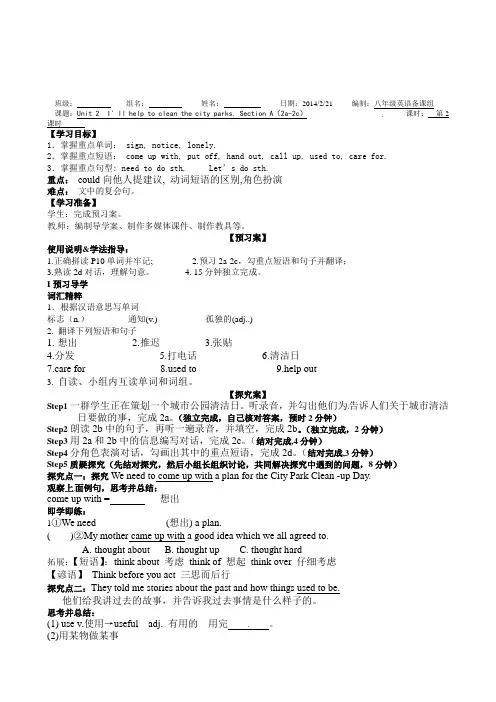
班级:组名:姓名:日期:2014/2/21 编制:八年级英语备课组课题:Unit 2 I’ll help to clean the city parks. Section A(2a-2c)课时:第2课时【学习目标】1.掌握重点单词: sign, notice, lonely.2.掌握重点短语: come up with, put off, hand out, call up, used to, care for.3.掌握重点句型: need to do sth. Let’s do sth.重点:could向他人提建议, 动词短语的区别,角色扮演难点:文中的复会句。
【学习准备】学生:完成预习案。
教师:编制导学案、制作多媒体课件、制作教具等。
【预习案】使用说明&学法指导:1.正确拼读P10单词并牢记;2.预习2a-2c,勾重点短语和句子并翻译;3.熟读2d对话,理解句意。
4. 15分钟独立完成。
I预习导学词汇精粹1.根据汉语意思写单词标志(n.)________ 通知(v.)__________ 孤独的(adj..)___________2. 翻译下列短语和句子1.想出_______2.推迟______3.张贴__________________4.分发____________5.打电话___________6.清洁日________________7.care for ______________ ed to______________ 9.help out_____________3. 自读、小组内互读单词和词组。
【探究案】Step1一群学生正在策划一个城市公园清洁日。
听录音,并勾出他们为告诉人们关于城市清洁日要做的事,完成2a。
(独立完成,自己核对答案,预时2分钟)Step2朗读2b中的句子,再听一遍录音,并填空,完成2b。
(独立完成,2分钟)Step3用2a和2b中的信息编写对话,完成2c。
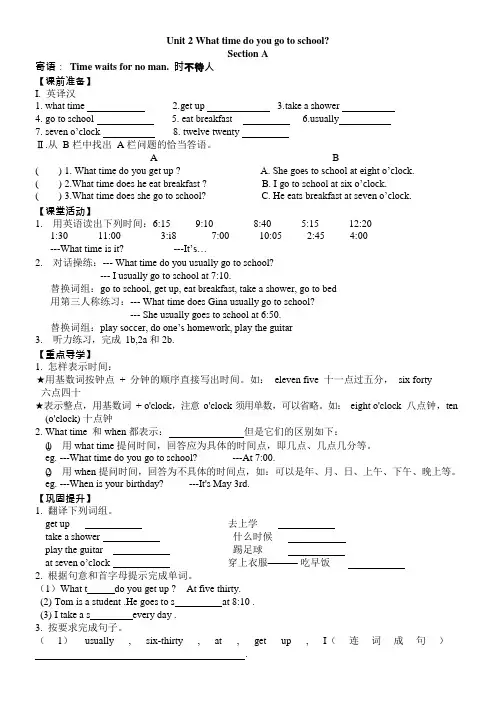
Unit 2 What time do you go to school?Section A寄语:Time waits for no man. 时不待人【课前准备】I.英译汉1.what time2.g et up3.t ake a shower4.go to school 7. seven o’clock5. eat breakfast8. twelve twentyuallyⅡ.从 B 栏中找出A 栏问题的恰当答语。
A B( ) 1. What time do you get up ? A. She goes to school at eight o’clock.( ) 2.What time does he eat breakfast ? B. I go to school at six o’clock.( ) 3.What time does she go to school? C. He eats breakfast at seven o’clock.【课堂活动】1. 用英语读出下列时间:6:15 9:10 8:40 5:15 12:201:30 11:00 3:i8 7:00---What time is it? ---It’s…10:05 2:45 4:002.对话操练:--- What time do you usually go to school?--- I usually go to school at 7:10.替换词组:go to school, get up, eat breakfast, take a shower, go to bed用第三人称练习:--- What time does Gina usually go to school?--- She usually goes to school at 6:50.替换词组:play soccer, do one’s homework, play the guitar3.听力练习,完成1b,2a 和2b.【重点导学】1.怎样表示时间:★用基数词按钟点+ 分钟的顺序直接写出时间。
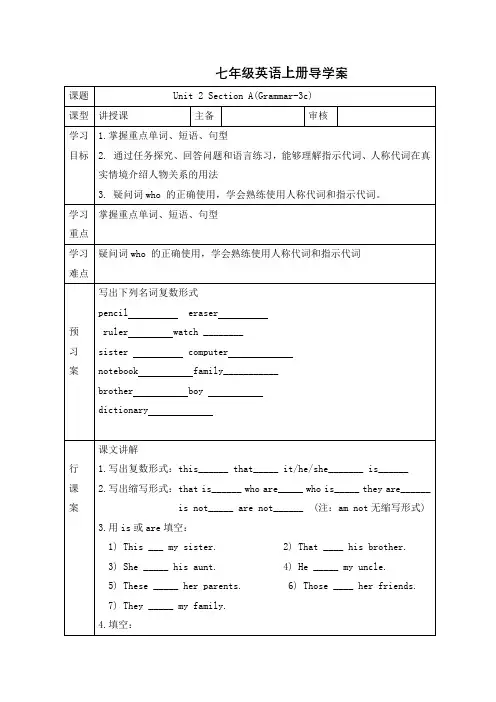
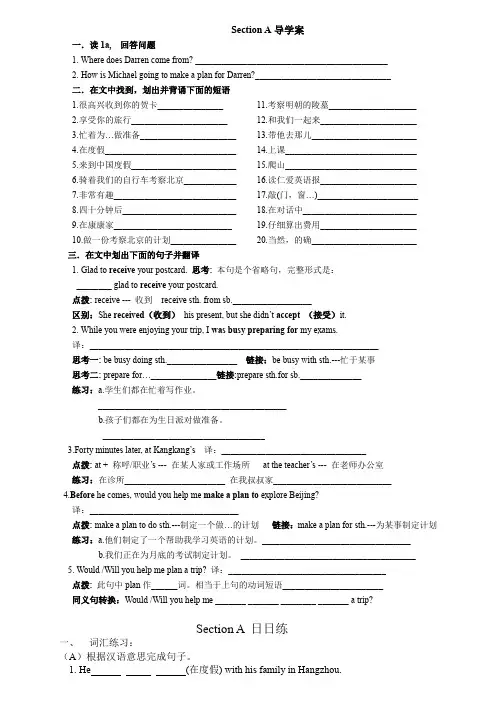
Section A导学案一.读1a, 回答问题1. Where does Darren come from? ____________________________________________2. How is Michael going to make a plan for Darren?_______________________________ 二.在文中找到,划出并背诵下面的短语1.很高兴收到你的贺卡_______________2.享受你的旅行______________________3.忙着为…做准备______________________4.在度假______________________________5.来到中国度假________________________6.骑着我们的自行车考察北京____________7.非常有趣____________________________8.四十分钟后__________________________9.在康康家___________________________10.做一份考察北京的计划_______________ 11.考察明朝的陵墓____________________12.和我们一起来______________________13.带他去那儿________________________14.上课______________________________15.爬山______________________________16.读仁爱英语报______________________17.敲(门,窗…)_______________________18.在对话中__________________________19.仔细算出费用______________________20.当然,的确________________________三.在文中划出下面的句子并翻译1. Glad to receive your postcard. 思考:本句是个省略句,完整形式是:________ glad to receive your postcard.点拨: receive --- 收到receive sth. from sb.__________________区别:She received(收到)his present, but she didn’t accept (接受)it.2. While you were enjoying your trip, I was busy preparing for my exams.译:__________________________________________________________________思考一: be busy doing sth.________________ 链接:be busy with sth.---忙于某事思考二: prepare for…_______________链接:prepare sth.for sb.______________练习:a.学生们都在忙着写作业。
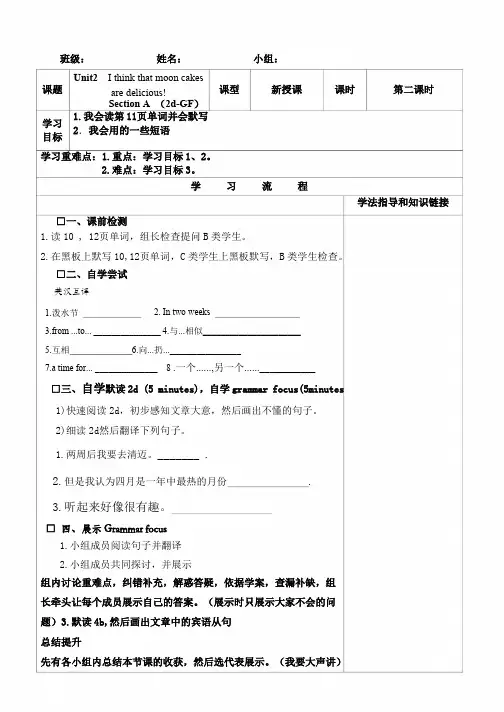
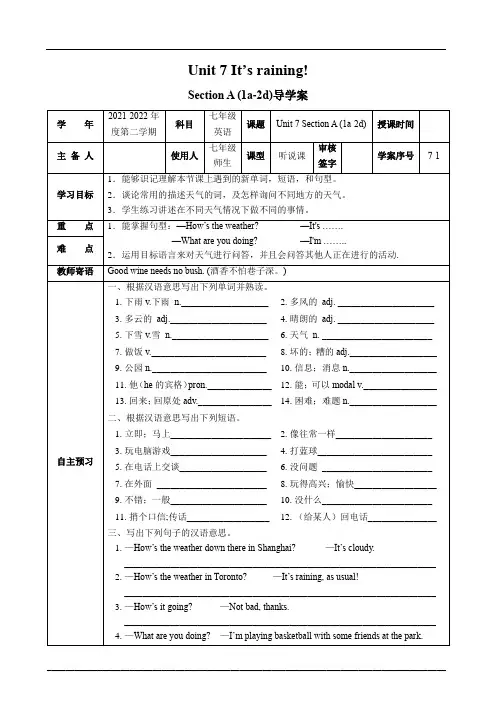
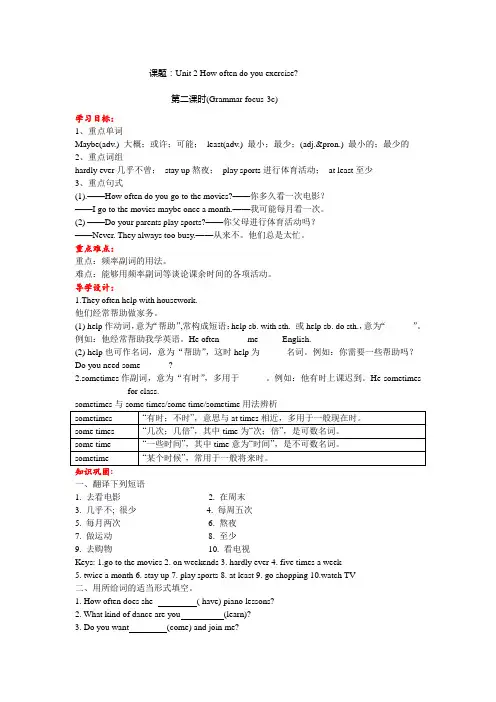
课题:Unit 2 How often do you exercise?第二课时(Grammar focus-3c)学习目标:1、重点单词Maybe(adv.) 大概;或许;可能;least(adv.) 最小;最少;(adj.&pron.) 最小的;最少的2、重点词组hardly ever几乎不曾;stay up熬夜;play sports进行体育活动;at least至少3、重点句式(1).——How often do you go to the movies?——你多久看一次电影?——I go to the movies maybe once a month.——我可能每月看一次。
(2) ——Do your parents play sports?——你父母进行体育活动吗?——Never. They always too busy.——从来不。
他们总是太忙。
重点难点:重点:频率副词的用法。
难点:能够用频率副词等谈论课余时间的各项活动。
导学设计:1.They often help with housework.他们经常帮助做家务。
(1) help作动词,意为“帮助”,常构成短语:help sb. with sth. 或help sb. do sth.,意为“______”。
例如:他经常帮助我学英语。
He often ______me _____English.(2)help也可作名词,意为“帮助”,这时help为______名词。
例如:你需要一些帮助吗?Do you need some ______?2.sometimes作副词,意为“有时”,多用于______。
例如:他有时上课迟到。
He sometimes ______ _____ for class.知识巩固:一、翻译下列短语1. 去看电影________________2. 在周末___________3. 几乎不; 很少_____________4. 每周五次__________5. 每月两次_______________6. 熬夜____________7. 做运动_________________ 8. 至少_____________9. 去购物_________________ 10. 看电视_____________Keys: 1.go to the movies 2. on weekends 3. hardly ever 4. five times a week5. twice a month6. stay up7. play sports8. at least9. go shopping 10.watch TV二、用所给词的适当形式填空。
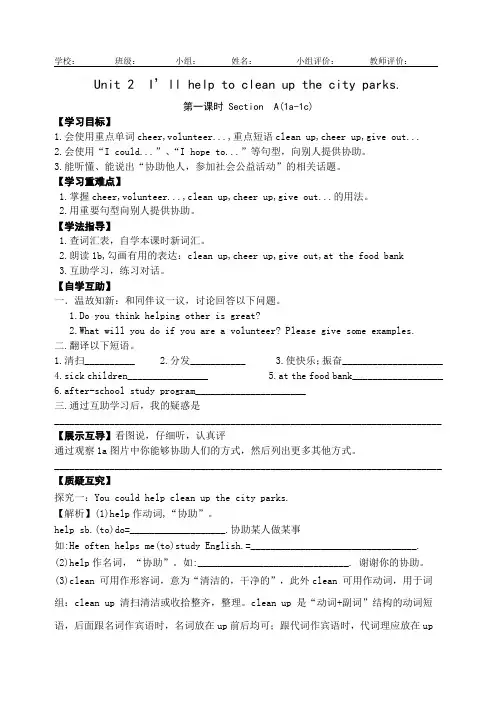
学校:班级:小组:姓名:小组评价:教师评价:Unit 2 I’ll help to clean up the city parks.第一课时 Section A(1a-1c)【学习目标】1.会使用重点单词cheer,volunteer...,重点短语clean up,cheer up,give out...2.会使用“I could...”、“I hope to...”等句型,向别人提供协助。
3.能听懂、能说出“协助他人,参加社会公益活动”的相关话题。
【学习重难点】1.掌握cheer,volunteer...,clean up,cheer up,give out...的用法。
2.用重要句型向别人提供协助。
【学法指导】1.查词汇表,自学本课时新词汇。
2.朗读1b,勾画有用的表达:clean up,cheer up,give out,at the food bank3.互助学习,练习对话。
【自学互助】一.温故知新:和同伴议一议,讨论回答以下问题。
1.Do you think helping other is great?2.What will you do if you are a volunteer? Please give some examples.二.翻译以下短语。
1.清扫__________2.分发___________3.使快乐;振奋____________________4.sick children________________5.at the food bank__________________6.after-school study program______________________三.通过互助学习后,我的疑惑是_____________________________________________________________________________ 【展示互导】看图说,仔细听,认真评通过观察1a图片中你能够协助人们的方式,然后列出更多其他方式。
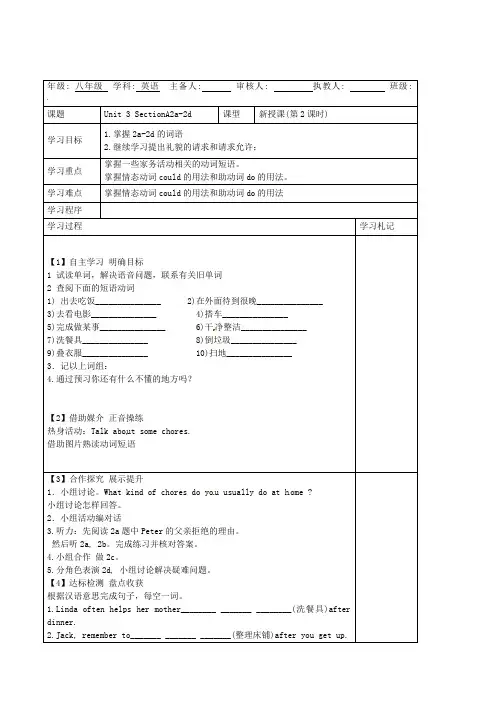
年级: 八年级学科: 英语主备人: 审核人: 执教人: 班级: 课题Unit 3 SectionA2a-2d 课型新授课(第2课时)学习目标1.掌握2a-2d的词语2.继续学习提出礼貌的请求和请求允许;学习重点掌握一些家务活动相关的动词短语。
掌握情态动词could的用法和助动词do的用法。
学习难点掌握情态动词could的用法和助动词do的用法学习程序学习过程学习札记【1】自主学习明确目标1 试读单词,解决语音问题,联系有关旧单词2 查阅下面的短语动词1) 出去吃饭_______________ 2)在外面待到很晚_______________3)去看电影_______________ 4)搭车_______________5)完成做某事_______________ 6)干净整洁_______________7)洗餐具_______________ 8)倒垃圾_______________9)叠衣服_______________ 10)扫地_______________3.记以上词组:4.通过预习你还有什么不懂的地方吗?【2】借助媒介正音操练热身活动:Talk about some chores.借助图片熟读动词短语【3】合作探究展示提升1.小组讨论。
What kind of chores do yo u usually do at h ome ?小组讨论怎样回答。
2.小组活动编对话3.听力:先阅读2a题中Peter的父亲拒绝的理由。
然后听2a, 2b。
完成练习并核对答案。
4.小组合作做2c。
5.分角色表演2d, 小组讨论解决疑难问题。
【4】达标检测盘点收获根据汉语意思完成句子,每空一词。
1.Linda often helps her mother________ _______ ________(洗餐具)afterdinner.2.Jack, remember to_______ _______ _______(整理床铺)after you get up.3.---Could I_______ ________ ________(搭便车)to the center of the city? ---Certainly, please get into the car.4.We can’t______ ______ _______(在外面待到很晚)on weekdays.5.---Lucy, have you finished_______ _______ ________ ________(打扫客厅)?---Sorry, I’ll do it at once.选择填空。
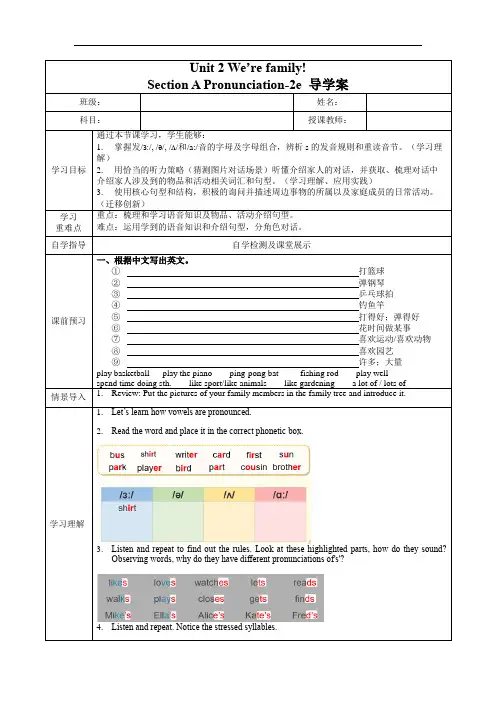
1.Let’s learn how vowels are pronounced.2.Read the word and place it in the correct phonetic box.3.Listen and repeat to find out the rules. Look at these highlighted parts, how do they sound?Observing words, why do they have different pronunciations of's'?4.Listen and repeat. Notice the stressed syllables.1.Look at the picture and answer the questions to predict.❑Who are they?❑where are they?❑What are they talking about?❑what can you see in the room?2.Listen to the conversation, circle the words you hear.Teng Fei:Hi, Peter! Come in./ Welcome.Peter:Thanks. Oh, these ping-pong bats are nice. Whose are they?Teng Fei:Well, this is my ping-pong bat, and the black / red one is my grandpa’s.Peter:Do you often play ping-pong together?Teng Fei:Yes, we play every day / week. My grandpa loves sport.Peter: Whose fishing rods are those?Teng Fei:They’re my father’s. He spends a lot of / lots of time fishing.Peter:Hey, do you play the piano?Teng Fei:No, it’s my mother’s piano. She can play it really / very well.3.Read the conversation and complete the table about Teng Fei's family.4.Look at the photo and find out the family members of Li Xin.5.Match the activities with each person.e the photo to talk about Li Xin’s family.1.Bring some photos of things your family members have. In pairs, ask and answer questions about1.Read the word and place it in the correct phonetic box.2.Listen and repeat to find out the rules. Look at these highlighted parts, how do they sound?Observing words, why do they have different pronunciations of's'?1.Look at the picture and answer the questions to predict.❑Who are they? They are two students.❑where are they? A room? A house?❑What are they talking about? Maybe they are talking about the things in the room.❑what can you see in the room? Ping-pong bats, fishing rods and a piano.2.Listen to the conversation, circle the words you hear.3.Read the conversation and complete the table about Teng Fei's family.4.Look at the photo and find out the family members of Li Xin.5.Match the activities with each person.e the photo to talk about Li Xin’s family.略。
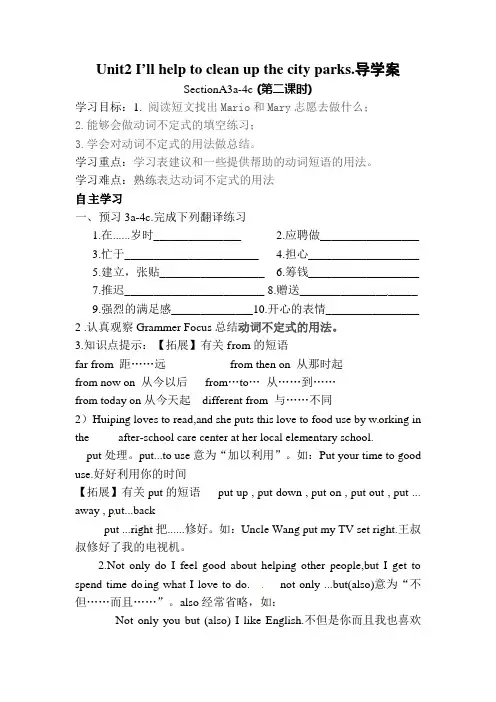
Unit2 I’ll help to clean up the city parks.导学案SectionA3a-4c (第二课时)学习目标:1.阅读短文找出Mario和Mary志愿去做什么;2.能够会做动词不定式的填空练习;3.学会对动词不定式的用法做总结。
学习重点:学习表建议和一些提供帮助的动词短语的用法。
学习难点:熟练表达动词不定式的用法自主学习一、预习3a-4c.完成下列翻译练习1.在......岁时_______________2.应聘做_________________3.忙于_______________________4.担心___________________5.建立,张贴__________________6.筹钱___________________7.推迟________________________ 8.赠送____________________9.强烈的满足感______________10.开心的表情________________2 .认真观察Grammer Focus总结动词不定式的用法。
3.知识点提示:【拓展】有关from的短语far from 距……远from then on 从那时起from now on 从今以后from…to…从……到……from today on从今天起different from 与……不同2)Huiping loves to read,and she puts this love to food use by w orking in the after-school care center at her local elementary school.put处理。
put...to use意为“加以利用”。
如:Put your time to good use.好好利用你的时间【拓展】有关put的短语put up , put down , put on , put out , put ... away , put...backput ...right把......修好。
Watch a video—What kind of dance is it?1. Clair and Jack are talking about weekend activities. Listen and match.2. Listen and read 2d quickly and answer the questions.1). Is Claire free next week? Why?2). What kind of dance is Claire learning?3). How often does Claire have dance lessons? How about her piano lessons?4). What does Claire invite Jack to do? When can Jack join Claire for the activity?3. retell the conversation.Claire is not next week. it is quite for her. She has and lessons. And she has swing dance every Monday, it’s . How often does she have piano lessons? , on Wednesday and Friday. Tuesday? She has play tennis with her friends.4. role play the conversation.1.频率副词在句子中的位置:2.频率短语练习1.Finish 3a. Complete the questions with do or does. Then match the questions and answers.2. Finish 3buse the words given to write questions.Then ask and answer them with a partner.3. Make a conversation with your partner.1. How often do you do these activities? Fill in the chart and then make conversations.2. Make a conversation with your group member.一、单项选择。
人教版英语九年级全册第八单元Section A (2a-2d)导学案Unit 8 It must belong to Carla. Section A (2a-2d)预习目标:1、通过预习,掌握本节课的生词,会灵活运用。
2、通过预习,掌握关于某物属于某人的表达方法。
3、通过预习,继续学习用情态动词表示推测并表达理由。
预习导学:温故知新1、复习关于某物归某人所有的表达方法:(1). Look at this T-shirt , it’s beautiful . However , it’s not mine , it’s hers.(注意形容词性物主代词和名词性物主代词的用法。
)(2). The comfortable room isn’t Alice’s , it’s Bob and Tom’s. (注意名词所有格的用法。
)(3). I think teenagers should be allowed to choose their own clothes. (用one’s own表示某人自己的)(4). The history book must belong to Alice . Because there is the name on it’s cover.(用belong to sb.表示所属关系)2、情态动词must, might, could, can’t 后接动词原形, 可以表示对现在的情况的推测.must表示非常肯定的猜测,例如:The little boy must be Tom , he is the only kid at the picnic. might /could 表示有可能的猜测,例如:My Chinese teacher might \ could be from Sichuan , but I’m not sure.can’t 表示肯定不可能,例如:The little boy can’t be hungry , he just had a full bottle of milk. 练习巩固:1.-Is the boy _________ brother?_ No , he isn’t , it’s ________ brother.A. your; herB. yours ; herC. your; hersD. yours; hers2. ________ school is very beautiful and clean , and __________ is beautiful , too.A. Her ; oursB. Hers ; ourC. Hers ; ourD. Her ; our3.They are having fun in their _________________ room.A. parent’sB. parents’C. parentD. parents4.The good-looking woman is _____________ mother , she is a nurse in a big hospital.A. Alice and GraceB. Alice and Grace’sC. Alice’s and Grace’sD. Alice’s and Grace5.The man _________ be Mr. Li , he is longer than him.A.mustB. mustn’tC. can’tD. needn’t6. You __________ cross the road when the traffic lights turn red.A.mustB. mustn’tC. can’tD. needn’t参考答案:1.A 2.A 3.B 4.B 5.C 6.B预习导学:单词过关——根据例句提示,写出下列单词的汉语意思。
Unit 2 This is my sister.【课标要求】1.能够简单的英语交换个人和家庭简单信息2.初步了解英语国家中家庭成员之间的称呼习俗3.能在教师的指导下进行简单的角色表演第二课时【课时目标】1.通过观察教材图片,听音练习,再次熟悉掌握本单元的词汇:parents, mother, father, sister, brother, grandmother, grandfather,friend,grandparents.2.通过2b熟悉重点句型: This is my mother,Jenny./Are these your parents?并把名字和图片中的人物进行匹配,以达到复习前一单元姓名和学习本单元人物关系的称谓。
3.通过2c对话练习,尝试使用句型Who’s she? She’s Cindy.根据图片进行练习。
4.在相应更复杂的语境中,尝试学习和模仿。
【评价任务】1.通过观察图片能,老师介绍,能正确读出单词,并圈出所听到的单词(检测课时目标1)1.通过听前语境的感知,学生带着目的去听。
把名字和图中的人物配对。
(检测课时目标1、2)2.利用2b的图片进行对话练习(检测课时目标3)3.朗读,模仿,分角色表演对话(检测课时目标4)【学习过程】课前准备1.手绘一张全家福(大家庭为宜成员包括到爸爸妈妈、爷爷奶奶、哥哥姐姐或者弟弟妹妹)课中学习任务一1.看主题图猜图中的人物。
2.听录音,圈出听到的单词。
全班一起核对答案。
3.细读2b的要求,听前预读人物名字。
听,将名字与图中的人物配对。
4.再听一次,完成填空Li Lan: Cindy, is this your family photo?Cindy: Yes, it is, Li Lan.Li Lan: Are these your _________?Cindy: Yes, they are. This is my ________,Jenny, and this is my ________, Tom.Li Lan: Oh, _______ she?Cindy: She’s my _______, Mary.Li Lan: _______ they?Cindy: They’re my _______________, Linda andBob.Li Lan: And _______ he?Cindy: He’s my ___________, Jack.5.听音并跟读,模仿语音语调,并关注缩略形式。
Unit 2 I think that mooncakes are delicious!Section A 1a-2d学案【学习目标】1.听说读写mooncake , lantern , stranger , relative , put on , pound2.我初步了解感叹句和宾语从句。
3.我会用感叹句和宾语从句表达对节日的喜好和看法。
【学习重难点】理解并初步用含that和if/whether引导的宾语从句。
【自主预习】:自学自查:1.写出下列单词或短语:1.亲属,亲戚n._______2. 陌生人n.__________3.外出吃饭________4.增加(体重)_____________5.相互泼水_____________6.冲掉,冲走__________7.泼水节____________8.龙舟节_________9. 中国春节___________ 10. 元宵节_____________2.翻译短语1)next year______________ 2)like eating outside _________3)on your vacation___________ 4)增加(体重);发胖__________5)一天吃五顿饭____________ 6)看比赛_____________3.翻译句子1) What a great day ! ___________________2) How fantastic the dragon boat teams were!.3)Mary thinks that the teams were fantastic._________________4) Bill wonders whether they’ll have zongzi again next year._________________________________________________思考:1. 感叹句是怎么构成的?2.3),4)句中的宾语有什么特点?语序有什么特点?时态有什么特点(参看课本P152)自主学习1. 完成教材1a-1c的任务,播放录音一遍.2.完成教材2a-2d的任务,完成2a,2b的听力任务。
第2单元How often do you exercise?Section A 单词housework n.家务劳动;家务事hardly adv.几乎不;几乎没有ever adv.在任何时候;从来;曾经once adv.一次;曾经twice adv.两次;两倍Internet n.(国际)互联网;因特网program n.(=programme)节目full adj.忙的;满的;充满的swing n.摆动;秋千v.(使)摆动;摇摆maybe adv.大概;或许;可能least adv.最小;最少adj.&pron.最小的;最少的短语hardly ever几乎从不help with housework帮忙做家务on weekends在周末how often多久一次go shopping去购物once a week每周一次twice a month每月两次go to the movies去看电影be free有空every day每天use the Internet用互联网swing dance摇摆舞play tennis打网球at least至少;不少于句型1.—What do you usually do on weekends? 你周末通常做什么?—I always exercise. 我总是锻炼。
2.—How often do you go to the movies? 你多久看一次电影?—I go to the movies maybe once a month. 我大概每月去看一次电影。
Section B 单词coffee n.咖啡health n.健康;人的身体(或精神)状态result n.结果;后果percent n.百分之……online adj.&adv.在线(的);联网(的)television n.电视节目;电视机although conj.虽然;尽管;即使through prep.以;凭借;穿过mind n.头脑;心智body n.身体such adj.&pron.这样的;那样的;类似的together adv.在一起;共同die v.消失;灭亡;死亡writer n.作者;作家dentist n.牙科医生magazine n.杂志;期刊however adv.然而;不过almost adv.几乎;差不多none pron.没有一个;毫无junk n.无用的东西;无价值的东西than prep.&conj.(用以引出比较的第二部分)比less adv.较少;较小adj.&pron.较少的;更少的point n.得分;点v.指,指向短语junk food垃圾食品such as 例如;像……这样more than多于less than少于the answers to ……的答案good/bad habits 好/坏习惯句型1. She says it 's good for my health. 她说它对我的身体有好处。
1.Look at the pictures and review.Then try to read them loudly.1.Listen and repeat2.Let’s know more about our new friends_________________________________________________________________________________________________________________________________________________________________________________________________________________________________________________________________1.Pronunciation:Help them find their friends_________________________________________________________________________________2.Listen and circle the sentences you hear.Then repeat them.3.Pay attention to the pronunciation of the contractions.4.2a Look and guess①Who are they in the photo?__________________________________________________________②Where are they ?__________________________________________________________③How do you think they feel ?__________________________________________________________ 5.2a Listen to the conversation and circle the words you hear.6.2b Read the conversation and answer the questions.①Who is Mr Smith ?A.Chen Jie’s class teacher.B. Chen Jie and Peter’s English teacher②What is Ms Gao’s first name ?A Hui B.Gao③Why did Peter make the mistake?______________________________________________________7.Read the conversation and complete the table with the information about Mr Smith and Peter.8.Listen again and pay attention to the pronunciation of who’s, I’m, he’s, and it’s. Then role-play the conversation.Complete the table with what you know about these students.Then introduce(介绍)them to your classmates.This is my new friend,__________(name).He/She’s in_____________(class).He/She’s from_____________(country).He/She’s _______________(age).His/Her class teacher is Mr/Ms_________.【参考答案】1.Listen and repeat略2.Let’s know more about our new friends1.Pronunciation:Help them find their friends2.Listen and circle the sentences you hear.Then repeat them.3.Pay attention to the pronunciation of the contractions.4.2a Look and guess①Who are they in the photo?They are a teacher and two students.Maybe they are classmates.②Where are they ?They are in the school.③How do you think they feel ?They look happy.5.2a Listen to the conversation and circle the words you hear.6.2b Read the conversation and answer the questions.①B ②A ③Because of cultural differences.(文化差异)7.Read the conversation and complete the table with the information about Mr Smith and Peter.8.Listen again and pay attention to the pronunciation of who’s, I’m, he’s, and it’s. Then role-play the conversation.一、请将下列单词按照其划线字母的读音归类。